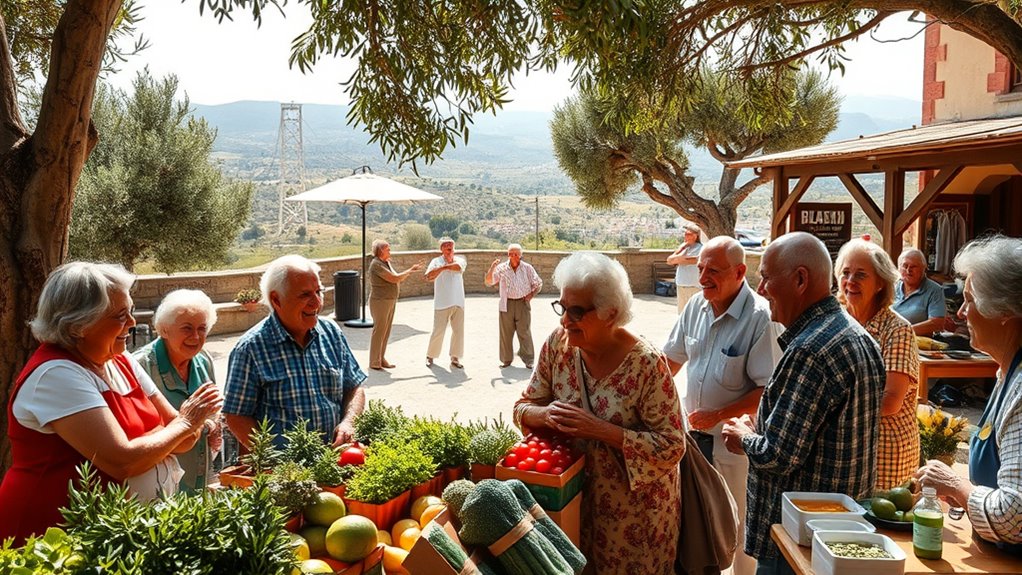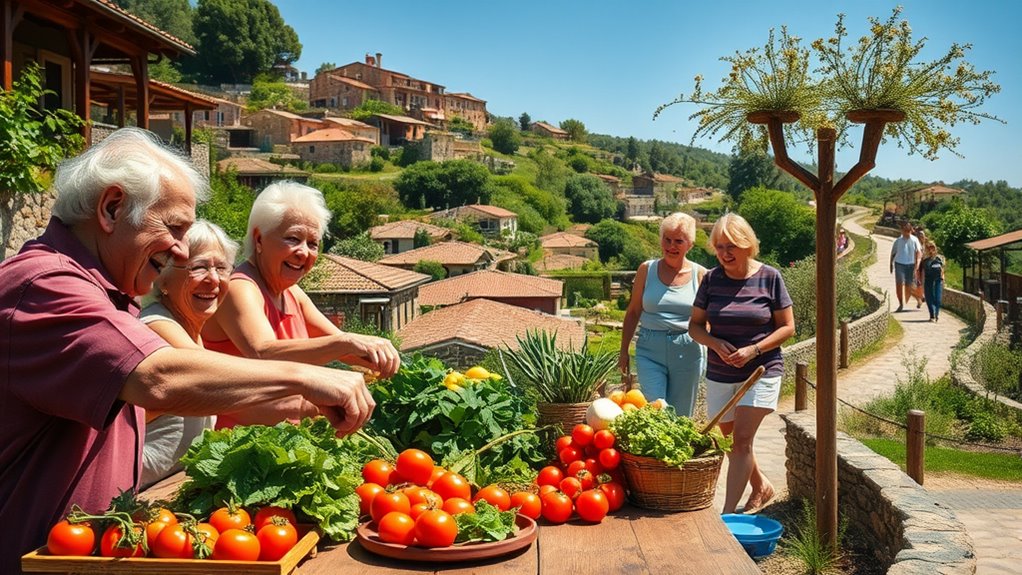To embrace Blue Zone habits, focus on whole, fresh foods like fruits, veggies, whole grains, and healthy fats. Foster strong social connections by sharing meals and engaging in community activities. Incorporate gradual changes, like adding more plant-based options to your diet and staying active with friends. These choices can lead to better health and longevity. Stick around to discover more ways to turn these habits into a sustainable lifestyle.
Key Takeaways
- Adopt a Mediterranean diet rich in whole foods, fresh produce, and healthy fats to promote overall health and prevent chronic diseases.
- Foster strong social connections through shared meals and community activities to enhance emotional well-being and lower stress levels.
- Engage in consistent physical activity, such as walking or cycling, to maintain a healthy weight and improve physical health.
- Integrate plant-based foods gradually into your meals to enjoy greater variety and health benefits over time.
- Join local clubs or groups that align with personal interests to build community connections and encourage regular social engagement.

While you may not live in one of the world’s renowned Blue Zones, adopting their habits can still boost your longevity and well-being. One of the key factors in these healthy communities is their diet, particularly the Mediterranean diet. This way of eating emphasizes whole foods, fresh fruits, vegetables, whole grains, nuts, and healthy fats like olive oil. By incorporating these elements into your meals, you won’t just enjoy tasty dishes; you’ll also provide your body with essential nutrients that can enhance your overall health.
Instead of processed foods, try to fill your plate with colorful veggies and lean proteins. You might find that a simple Mediterranean-style meal, such as grilled salmon with a side of roasted vegetables, not only tastes great but also leaves you feeling satisfied and energized. When you prioritize foods that nourish your body, you’re more likely to maintain a healthy weight and reduce your risk of chronic diseases.
Fill your plate with vibrant veggies and lean proteins for a satisfying, health-boosting Mediterranean meal.
Another crucial aspect of Blue Zones is social engagement. In these communities, people prioritize their relationships and cultivate strong social networks. You might be surprised at how much your social life impacts your health. Engaging with friends, family, and your community can lead to lower stress levels and a sense of belonging. Make a point to connect with others regularly, whether it’s sharing a meal, participating in group activities, or simply having a chat over coffee. These interactions can promote emotional well-being and contribute to a longer, healthier life.
Consider joining a local club or organization that aligns with your interests. It can be anything from a gardening group to a book club. Not only will you meet new people, but you’ll also find joy in shared experiences. This sense of community can be a powerful motivator to stay active and engaged.
You don’t need to completely overhaul your lifestyle to embrace these Blue Zone habits. Start small by adding more plant-based foods to your diet and reaching out to friends or neighbors for social activities. Gradually, you’ll notice the positive changes in your well-being. The key is consistency; the more you make these habits a part of your daily life, the more benefits you’ll reap. By adopting aspects of the Mediterranean diet and fostering social connections, you’re setting yourself up for a healthier, happier future. Additionally, incorporating regular physical activity, such as changing gears on a gravel bike, can further enhance your fitness and overall health.
Frequently Asked Questions
What Are the Specific Locations of the Blue Zones?
The specific geographical locations of the Blue Zones include Sardinia, Italy; Okinawa, Japan; Nicoya Peninsula, Costa Rica; Ikaria, Greece; and Loma Linda, California. Each of these areas showcases unique cultural influences that contribute to the longevity of their residents. You’ll notice how diet, social connections, and lifestyle practices play a significant role in their health. Exploring these locations can inspire you to adopt habits that promote a longer, healthier life.
How Can I Implement Blue Zone Habits in My Daily Life?
Think of your life as a garden; healthy eating and social connections are the sunlight and water it needs to thrive. Start by filling your plate with vibrant fruits and vegetables, making meals a celebration with family or friends. Join community groups or share hobbies that foster relationships. Prioritize movement, whether it’s a walk with a friend or a dance class. With these habits, you’ll cultivate a life full of vitality and joy.
Are There Any Scientific Studies Supporting Blue Zone Findings?
Yes, there’s scientific evidence supporting Blue Zone findings. Health research reveals that lifestyle factors in these regions—like diet, physical activity, and social connections—contribute to longer, healthier lives. Studies have shown that plant-based diets reduce chronic diseases, while strong community ties enhance mental well-being. By incorporating these habits into your life, you can harness the benefits backed by extensive research and potentially improve your own health and longevity.
What Age Group Benefits Most From Blue Zone Practices?
Older adults, particularly those in their 60s and beyond, benefit most from Blue Zone practices. Isn’t it amazing how healthy aging can substantially impact your quality of life? By adopting these habits, you can enhance your lifespan extension and improve overall well-being. Engaging in regular physical activity, maintaining strong social ties, and eating a plant-based diet are essential. So, why not embrace these practices to enjoy a healthier, longer life?
Can Blue Zone Habits Help Prevent Chronic Illnesses?
Absolutely, blue zone habits can help prevent chronic illnesses. By making diet modifications, like eating more plant-based foods and less processed items, you can markedly improve your health. Community engagement is also key; when you connect with others, you foster support and motivation. Surrounding yourself with healthy habits and like-minded individuals creates an environment that encourages wellness, ultimately reducing the risk of chronic diseases and promoting a longer, healthier life.
Conclusion
In exploring the habits of Blue Zones, you’ve uncovered a profound truth: longevity isn’t just about genetics; it’s about lifestyle choices. By embracing community, prioritizing movement, and nurturing a purpose, you can transform your daily routine. It’s not merely about living longer but living better. So, take these lessons to heart and make small, meaningful changes that can lead to a healthier, happier life. Remember, your best years are shaped by the choices you make today.










